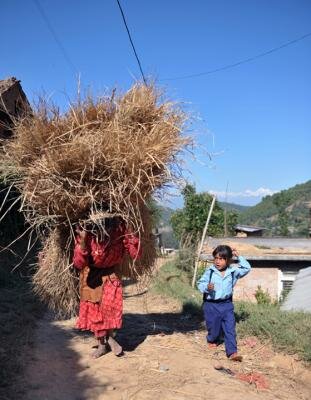The Tears Need to Stop at the Airport
Nepali parents should quit being emotional when their kids leave to work abroad. These young people will gain skills and experience that can one day help bring progress and prosperity to their country.
Even for a young girl playing in the dirt road in front of her home in rural Nepal, the entire world is her eventual playground. That's the reality of this digitally free world of today.
While elders may lament the dryness of the local bazaar, devoid of young blood, if they were able to see 10-20 years into the future, they would realise that the lost boys and girls of rural Nepal have the potential to be the harbingers of prosperity in their towns and villages, the same prosperity that conniving politicians have been promising for the past several generations.
For a young person with an internet connection in a single-room apartment in New Baneshwor that he or she shares with a friend, the world is limitless. The walls of the apartment have crumbled and the opportunities for success anywhere in the world are abundant.
The thousands of Nepali youth who go abroad every year, in search of a better future, have neither the world to fear nor lament losing their homes. As these youth improve their skills and capacity, they help not just themselves and their families, but their communities and society. Consider how remittance has supported the Nepali economy.
Yet remittances alone aren't enough; we need to establish more sustainable ways of contributing to Nepal's development.

Since the days of long ago when the inhabitants of the Deccan plateau moved north and those beyond the Himalayas moved to the fertile south, migration in search of better opportunities has remained a constant phenomenon.
It is unfortunate that we have yet to learn the value of migration and capitalise on the new skills and knowledge gleaned by our sons and daughters abroad to help our society at home. On the contrary, we as a society of emotional mothers and fathers, are soaked in self-pity and live in constant lament of the departed. We need to stop with the self-pity. The tears need to stop at the airport or the bus terminal.
The youth of Nepal are sweating in the sweltering heat of the Middle East, erecting scaffolding 100 meters high with dust control mechanisms for skyscrapers. These can be used in Nepal to reduce the dust in the streets of Kathmandu.
They are learning how to irrigate the acres of bone-dead land in Jordan; the technology for which can help irrigate the hills of Baitadi and Bajura. They are designing INTEL Pentium microchips in Oregon, USA, and they are diversifying investments and loan risks for Merrill Lynch, which can be helpful to our banks to reduce their dangerous dependence on real-estate.
Nepali youth are managing factories and malls from London to Belarus; they are designing drinking water systems in Brisbane, Australia. If there are any true leaders in Nepal, they will prepare the road for these “lost boys and girls” to return and contribute to the growth of the country.
Given the incompetence of our current political leaders, it is up to the Nepali diaspora to lobby them to ensure that these roads are paved so that skills and knowledge can return to Nepal more easily and efficiently.
One of the ways to do this is to get donor agencies, like the World Bank, the Asian Development Bank, and the UK Department for International Development, to require local consultant teams comprising skilled Nepali diaspora in their applications for development projects.
If this mechanism is implemented, companies from all around the world will seek out skilled Nepali diaspora and use their skills in the development of Nepal. What better and easy way to help Nepal than this? The Non-Resident Nepali Association, Nepal Engineers Association and other diaspora groups are well-advised to take up the issue. Nepali society should not look down upon emigrants but instead embrace them and find creative ways to utilise their new skills to develop all facets of Nepali society.
This post was originally published in V.E.N.T. in November 2010.

















